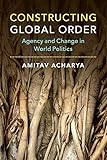Constructing global order : agency and change in world politics / Amitav Acharya.
Publication details: Cambridge, United Kingdom ; New York, NY : Cambridge University Press, c2018.Description: xiii, 215 pages : illustrations ; 24 cmISBN:- 9781316621783 (paperback)
- 9781107170711 (hardback)
- 341.2 23
- JZ1318 .A275 2018
| Item type | Current library | Home library | Call number | Copy number | Status | Date due | Barcode | Item holds |
|---|---|---|---|---|---|---|---|---|
 Book
Book
|
Ayesha Abed Library General Stacks | Ayesha Abed Library General Stacks | 341.2 ACH (Browse shelf(Opens below)) | 1 | Available | 3010037548 |
Browsing Ayesha Abed Library shelves, Shelving location: General Stacks Close shelf browser (Hides shelf browser)

|

|

|

|

|

|

|
||
| 341.076 VER The public international law study guide for students : | 341.095 OXF The Oxford handbook of international law in Asia and the Pacific / | 341.095 OXF The Oxford handbook of international law in Asia and the Pacific / | 341.2 ACH Constructing global order : | 341.2 POL The politics of global governance : | 341.23 URQ A world in need of leadership : | 341.2305 BAS Basic facts about the United Nations / |
Includes bibliographical references and index.
Machine generated contents note: 1. Introduction: rethinking agency and change in global order; 2. Theorizing normative change; 3. Provincializing Westphalia; 4. Transforming Westphalia; 5. Redefining security; 6. Regionalism and the making of global order; 7. Conclusion and extensions.
"For a long time, international relations scholars have adopted a narrow view of what is global order, who are its makers and managers, and what means they employ to realize their goals. Amitav Acharya argues that the nature and scope of agency in the global order - who creates it and how - needs to be redefined and broadened. Order is built not by material power alone, but also by ideas and norms. While the West designed the post-war order, the non-Western countries were not passive. They contested and redefined Western ideas and norms, and contributed new ones of their own making. This book examines such acts of agency, especially the redefinitions of sovereignty and security, shaping contemporary world politics. With the decline of Western dominance, ideas and agency from the Rest may make it possible to imagine and build a truly global order"--
"For a long time, international relations scholars have adopted a narrow view of what is global order, who are its makers and managers, and what means they employ to realize their goals. Amitav Acharya argues that the nature and scope of agency in the global order - who creates it and how - needs to be redefined and broadened. Order is built not by material power alone, but also by ideas and norms. While the West designed the post-war order, the non-Western countries were not passive. They contested and redefined Western ideas and norms, and contributed new ones of their own making. This book examines such acts of agency, especially the redefinitions of sovereignty and security, shaping contemporary world politics. With the decline of the Western dominance, ideas and agency from the Rest may make it possible to imagine and build a truly global order. Amitav Acharya is Distinguished Professor of International Relations and the UNESCO Chair in Transnational Challenges and Governance at the School of International Service, American University, Washington, DC. His recent books include: The End of American World Order (2014); Rethinking Power, Institutions and Ideas in World Politics: Whose IR (2014); Whose Ideas Matter: Agency and Power in Asian Regionalism (2009) and Why Govern: Rethinking Demand and Progress in Global Governance (edited 2016). He is the first non-Western scholar to be elected as the President of the International Studies Association (ISA)"--
School of General Education


There are no comments on this title.